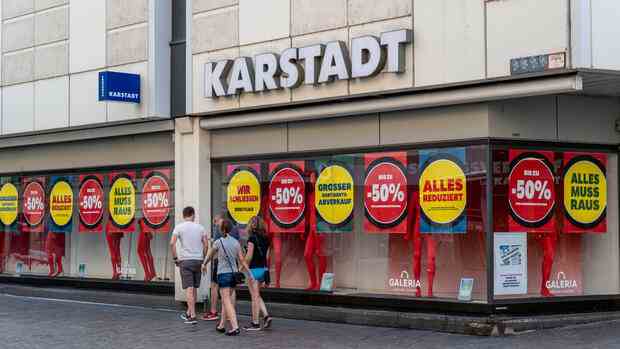Dusseldorf Empty shops, one-euro shops, amusement arcades: In many communities, the inner cities have been deserted for years. In addition, at least 40 other branches are now to be closed in the insolvency proceedings of the department store group Galeria Karstadt Kaufhof. “This will further increase the pressure on many municipalities,” says Iris Schöberl. As Managing Director of the real estate company CT Real Estate Partners Germany, she has been observing the problems for years and is also on the board of the real estate association ZIA.
However, a group of cities does not want to stand idly by and watch the development. Together with the trade research institute IFH and the Federal Ministry of Economics, they have set up a digital platform that significantly accelerates the search for new tenants for vacant shops. The tool puts the settlement management of the municipalities on a new, professional basis – and can now show initial successes.
For a good year, 14 municipalities from large Bremen to small Langenfeld worked on the platform called “LeAn” in the “City Laboratories” project. It not only offers an overview of a city’s real estate stock, but also a dashboard with relevant data on the environment and usability of the property. It has been in test mode since August.
Municipalities expect vacancy rates of up to 15 percent
The challenge is huge. According to a survey conducted by the Imakomm Academy among 750 representatives from municipalities and business associations, the vacancy rate in German cities could rise to up to 15 percent over the long term. Vacancies can only be limited to seven to eight percent in particularly attractive locations.
Top jobs of the day
Find the best jobs now and
be notified by email.
Hanau is an example of the progress that the new platform means for the cities. “Thanks to the opportunities that LeAn offers us, we have managed to fill a vacant shop at breathtaking speed,” says Martin Bieberle, Managing Director of the municipal construction management and project development company. In this case, it took just a week after the first personal conversation before a toy shop could open there.
LeAn works according to the Tinder principle, except that here cities and potential shop operators are looking for partners. 50 empty properties in six model cities were used for the test operation. On average, there were ten suggestions for usage concepts per property, and in almost all cases discussions have already taken place with interested parties. The platform is scheduled to go into regular operation in the new year, and many other municipalities have expressed an interest.
Because the problem is becoming more and more pressing for cities and municipalities, observes Eva Stüber from the IFH retail research institute. “You can still manage four to five vacancies quite well, but you can’t keep up with 20 to 30,” she says. Excel spreadsheets were no longer enough.
This is also confirmed by Andreas Bausewein, Mayor of Erfurt. “Until now, we have carried out our vacancy management in the same way,” says the politician. “It’s obvious that we have to make adjustments here.” He sees the digital upgrade as an opportunity to accelerate the subsequent letting process and thus “promote sustainable urban development”.
The problem is partly self-made. “In many cities, trade monocultures have emerged that no longer correspond to the image of an attractive, diverse and lively inner city,” says Hanau’s settlement manager Bieberle. It is becoming increasingly difficult to ensure the right mix. “Retail alone is no longer the magnet that draws people to the city center, it needs new neighbors such as gastronomy, culture, doctors, services, offices or sports facilities.”
The closure of Karstadt or Kaufhof exacerbates the problem
When flagships like Kaufhof or Karstadt close, that exacerbates the problems, says Bieberle. There is still a department store in Hanau, but it is unclear whether it will stay.
>> Read also: Galeria employees fear for jobs
“You have to say goodbye to the fact that you can rent a retail space of 4,000 square meters to a retailer again,” says the urban developer. For the large department stores, a mix of uses will have to be considered in the future. “When in doubt, you have to buy such properties and redevelop them together with a private investor,” he explains.
Real estate manager Schöberl accompanied the development of the LeAn platform from the point of view of the industry. At first she was skeptical, she admits. But she learned a lot from the exchange and thinks today that it is a very helpful tool for working together on the future of inner cities.
“The time factor is very important when fighting vacancies,” she knows from experience. “The digital settlement management can significantly reduce the time until the property is reoccupied.” The most important thing is the dialogue. “If you have the owners at the table when you talk, it’s easier to find flexible solutions for a new use of inner-city properties,” says Schöberl.
>> Read also: Declining sales, empty shops: New ideas for dying shopping temples
In Hanau, as in numerous other cities, the so-called right of first refusal statute has proven to be an important instrument. In case of doubt, the city can take over the property itself. “It puts us in a strong position towards the owners, but also forms the basis for building trusting relationships with them,” says city manager Bieberle. All those involved are forced to seek dialogue.
In this way, a use can be achieved that suits the landlord, but also has an eye on securing diversity in the city. “In the best case, we don’t have to make use of our right of first refusal,” says Bieberle. In just five out of 100 disputes, the city bought the property, in all other cases there were amicable solutions.
More: The end of every third branch is not enough – which problems the Galeria renovators have to solve now
